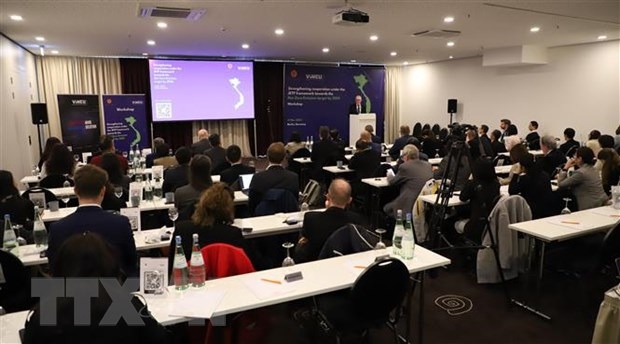Germany ready to support Vietnam in energy transition process
VOV.VN - The Vietnamese Embassy in Germany in collaboration with the Vietnamese Innovation Network in Europe (VINEU) organised a seminar on March 31 on strengthening co-operation within the framework of the Just Energy Transition Partnership (JETP) program towards net zero emissions target for Vietnam by 2050.

The event was held within the framework of the Berlin Energy Transformation Dialogue Week 2023.
As part of his opening speech, Vietnamese Ambassador to Germany Vu Quang Minh affirmed that this marked the first official and public in-depth discussion on the implementation of JETP, an important framework of which the nation was selected to join developed economies.
Ambassador Minh emphasized that at the 26th UN Climate Change Conference of Parties (COP26), the nation made both bold and ambitious commitments to become a carbon-neutral economy by 2050, only five years later than Germany.
This represents an extremely challenging goal, not only in terms of technology, economics, and finance, but also in social aspects associated with this great transition, including the rights and interests of all peoples and stakeholders.
Therefore, the country urgently needs the co-operation and support of international partners to achieve this goal. The seminar held on the sidelines of the Berlin Energy Transformation Dialogue Week 2023 can be viewed as a great opportunity for parties to address the issues and key aspects of the JETP implementation with a vision and action plan aimed at continuing the journey towards a green Vietnam and a green world, especially in today's complex and challenging international environment, the Vietnamese diplomat went on to say.
Currently, the Ministry of Industry and Trade of Vietnam is also trying to finalise the National Electricity Development Plan for the 2021 to 2030 period with a vision to 2050 towards gradually reducing dependence on fossil energy sources. This will mark a shift to focus on developing renewable energy sources such as hydropower, onshore and offshore wind power, solar power, and biomass in order to reduce greenhouse gas emissions in the time ahead.
In his online opening speech, Deputy Minister of Industry and Trade Dang Hoang An affirmed that after the COP26 Conference, the Vietnamese Prime Minister directly served as head of the National Steering Committee to focus on the implementation of Vietnamese commitments, duly assigning ministries and sectors to work out action plans in each field.
The energy transition process is therefore being directed to accelerate in the spirit of promoting internal resources, combined with enhanced ties and support from international partners along with bilateral and multilateral financial institutions.
Deputy Minister Dang Hoang An made it clear that along with the nation promoting its own internal resources, partners will be a companion to support the nation in achieving its net zero emissions target by 2050, as well as speeding up the peak greenhouse gas emissions and transform from fossil fuels to clean energy.
For his part, Jochen Flasbarth, State Secretary at the German Federal Ministry for Economic Cooperation and Development, expressed a special impression about his visit to Vietnam last September when he witnessed the nation’s efforts in deploying renewable energy.
According to Flasbarth, with the advantage of having a huge capacity from wind and solar energy, the country can become a pioneer in the energy transition process in Southeast Asia.
The Vietnamese government has also demonstrated its ambitious goals related to mitigating climate change and reducing dependence on thermal power plants as it prepares for a future clean energy system, he added.
However, Flasbarth said the energy transition can only be successful providing that it is done equitably and offers opportunities for domestic industries, as well as decent employment opportunities for local people.
Furthermore, the targets of the JETP must be quickly translated into concrete strategic policies and measures, Flasbarth said while affirming his nation’s readiness to become a reliable and capable partner for the Vietnamese energy transition process.
Available solutions of the EU in general and Germany in particular can be transferred to Vietnam through investment and trade activities.
As vice president of the VINEU, Cao The Anh, who represents Vietnamese experts, intellectuals, scientists, and businesses researching and working in Europe, is also committed to contributing to both national and international sustainable development through innovation, science-technology, and technology transfer.
Some opinions put forth at the event also showed that it is necessary to establish a joint working group in co-ordination Vietnamese and German relevant ministries in order to quickly carry out initiatives related to JETP.
